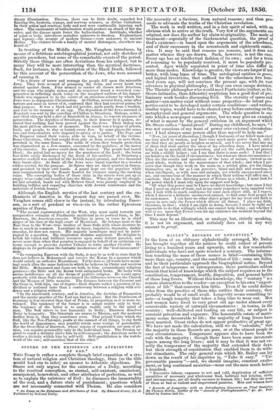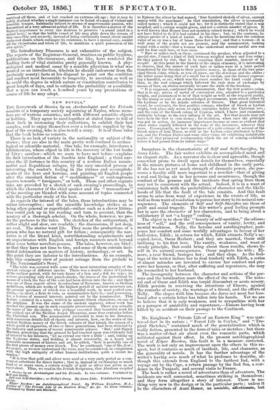BAILEY'S RECORDS OF LONGEVITY. * IN the form of an obituary
alphabetically arranged, Mr. Bailey has brought together all the notices he could collect of persons living to a hunlred years and upwards, with a few remarkable individuals who have not quite reached a century. The informa- tion touching the mass of these names is brief—containing little more than age, country, and the condition of life : some are fuller, and in their particulars approach the biographical notice. Beyond the fact of temperance or intemperance, these particulars seldom furnish that kind of knowledge which the subject requires as to the constitution, temperament, health, disposition, and general habits of these long livers. Without this knowledge, the century" is a remote abstraction to the reader—an exception to his own expect- ation of life" that concerns him little. Even if he could deduce rules from the practice of those who outlive their century, they probably would be of small avail. Longevity seems something in- nate—a tough tenacity that takes a long time to wear out. Men and women have lived to very great old age under almost every conceivable variety of outward. circumstances : in towns, in the country ; well-sheltered and leading an easy life, or subject to constant privation and exposure. The honourable estate of matri- mony seems favourable to life ; the majority of long livers have been married. Great riches do not appear productive of great age. We have not made the calculation, still we do " calculate," that the majority in these Records are poor, or at the utmost people in easy circumstances. Temperance appears also to have been the rule with the majority ; though there have been some inveterate topers among the long livers ; and it may be that it was not ex- actly the temperance of the majority that extended their days, but their strength of constitution that enabled them to do with- out stimulants. The only .general rule which Mr. Bailey can lay down as the result of his inquiries is, " Take it easy." " Un- governable passion "—and, we should imagine, constant excite- ment, or long continued anxieties—wear out the man much before a hundred.
" Excessive labour, exposure to wet and cold, deprivation of sufficient quantities of necessary and wholesome food, habitual bad lodging, sloth, and intemperance, are all deadly enemies to human life ; but they are none of them so bad as violent and ungoverned passions. Men and women have
• Records of Longevity : faith an Introductory Discourse on Vital Statistics. By Thomas Bailey, Author of the "Annals of Nottinghamshire," 47.e. #e. Pub-
lished by Dayton and Co.
survived all these, and at last reached an extreme old age ; but it may be safely doubted whether a single instance can be found of a man of violent and irascible temper, habitually subject to storms of ungovernable passion, who has arrived at a very advanced period of life. It is therefore a matter of the highest importance to every one desirous to preserve a sound mind in a sound body,' so that the brittle vessel of life may glide down the stream of time smoothly and securely, instead of being continually tossed about amidst rocks and shoals which endanger its existence, to have a special care, amidst all the vicissitudes and trials of life, to maintain a quiet possession of his own spirit."
The Introductory Discourse is not exhaustive of the subject. The reports of the Registrar-General, treatises on public hygiene, publications on life-insurance, and the like, have rendered the leading facts of vital statistics pretty generally known. A phy- siological and medical essay by a sensible physician is what was wanted as an introduction, wherein he should endeavour from the (certainly scanty) facts at his disposal to point out the condition and conduct most favourable to longevity, to ascertain as well as he could the degree in which nature or constitution contributes to great length of days, and to estimate the probability or possibility that a man can reach a hundred. years by any precautions or course of life he may adopt.



























 Previous page
Previous page